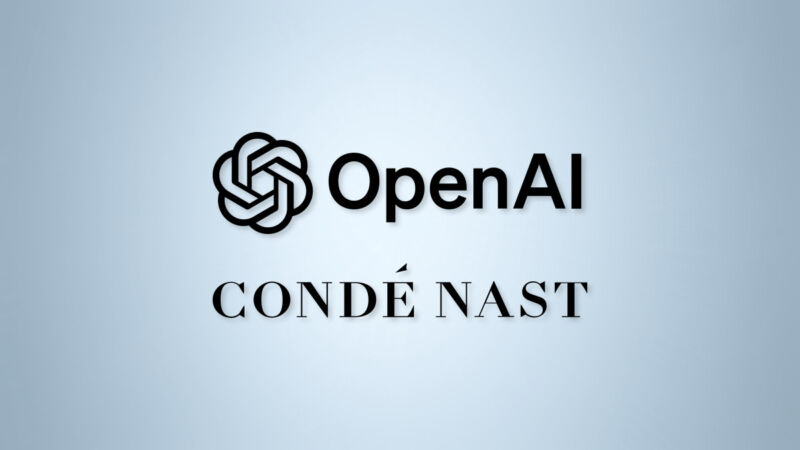Ars Technica content is now available in OpenAI services
Adventures in capitalism —
Condé Nast joins other publishers in allowing OpenAI to access its content.

Ars Technica
On Tuesday, OpenAI announced a partnership with Ars Technica parent company Condé Nast to display content from prominent publications within its AI products, including ChatGPT and a new SearchGPT prototype. It also allows OpenAI to use Condé content to train future AI language models. The deal covers well-known Condé brands such as Vogue, The New Yorker, GQ, Wired, Ars Technica, and others. Financial details were not disclosed.
One immediate effect of the deal will be that users of ChatGPT or SearchGPT will now be able to see information from Condé Nast publications pulled from those assistants’ live views of the web. For example, a user could ask ChatGPT, “What’s the latest Ars Technica article about Space?” and ChatGPT can browse the web and pull up the result, attribute it, and summarize it for users while also linking to the site.
In the longer term, the deal also means that OpenAI can openly and officially utilize Condé Nast articles to train future AI language models, which includes successors to GPT-4o. In this case, “training” means feeding content into an AI model’s neural network so the AI model can better process conceptual relationships.
AI training is an expensive and computationally intense process that happens rarely, usually prior to the launch of a major new AI model, although a secondary process called “fine-tuning” can continue over time. Having access to high-quality training data, such as vetted journalism, improves AI language models’ ability to provide accurate answers to user questions.
It’s worth noting that Condé Nast internal policy still forbids its publications from using text created by generative AI, which is consistent with its AI rules before the deal.
Not waiting on fair use
With the deal, Condé Nast joins a growing list of publishers partnering with OpenAI, including Associated Press, Axel Springer, The Atlantic, and others. Some publications, such as The New York Times, have chosen to sue OpenAI over content use, and there’s reason to think they could win.
In an internal email to Condé Nast staff, CEO Roger Lynch framed the multi-year partnership as a strategic move to expand the reach of the company’s content, adapt to changing audience behaviors, and ensure proper compensation and attribution for using the company’s IP. “This partnership recognizes that the exceptional content produced by Condé Nast and our many titles cannot be replaced,” Lynch wrote in the email, “and is a step toward making sure our technology-enabled future is one that is created responsibly.”
The move also brings additional revenue to Condé Nast, Lynch added, at a time when “many technology companies eroded publishers’ ability to monetize content, most recently with traditional search.” The deal will allow Condé to “continue to protect and invest in our journalism and creative endeavors,” Lynch wrote.
OpenAI COO Brad Lightcap said in a statement, “We’re committed to working with Condé Nast and other news publishers to ensure that as AI plays a larger role in news discovery and delivery, it maintains accuracy, integrity, and respect for quality reporting.”
Ars Technica content is now available in OpenAI services Read More »


